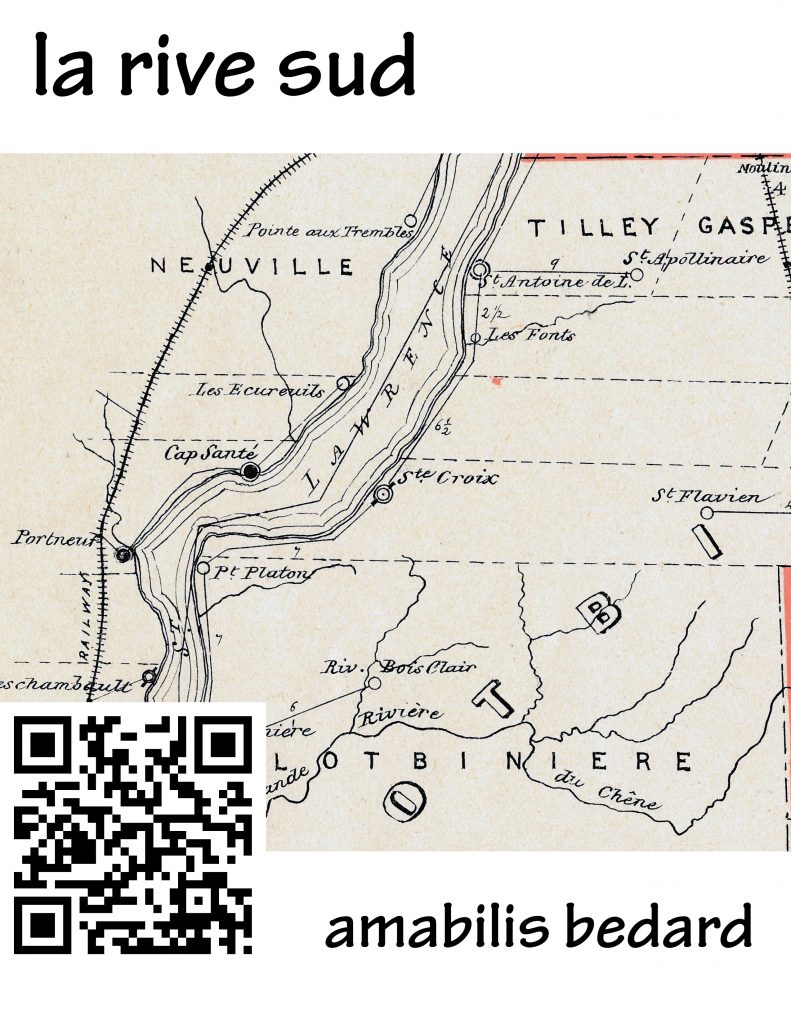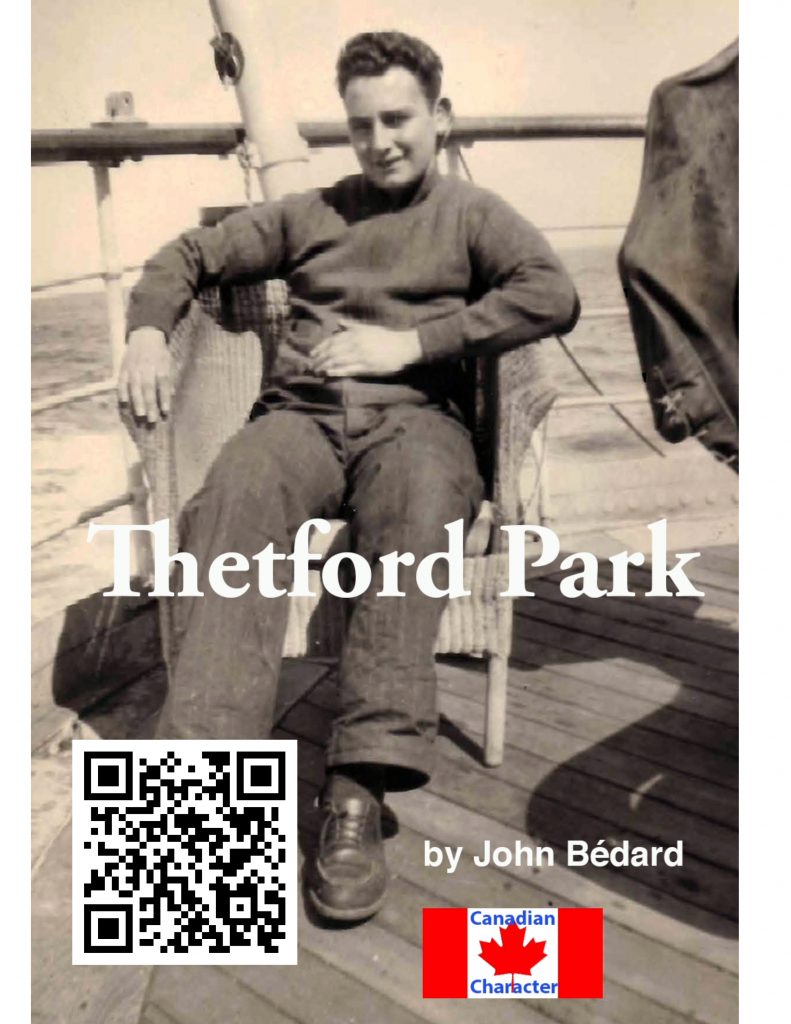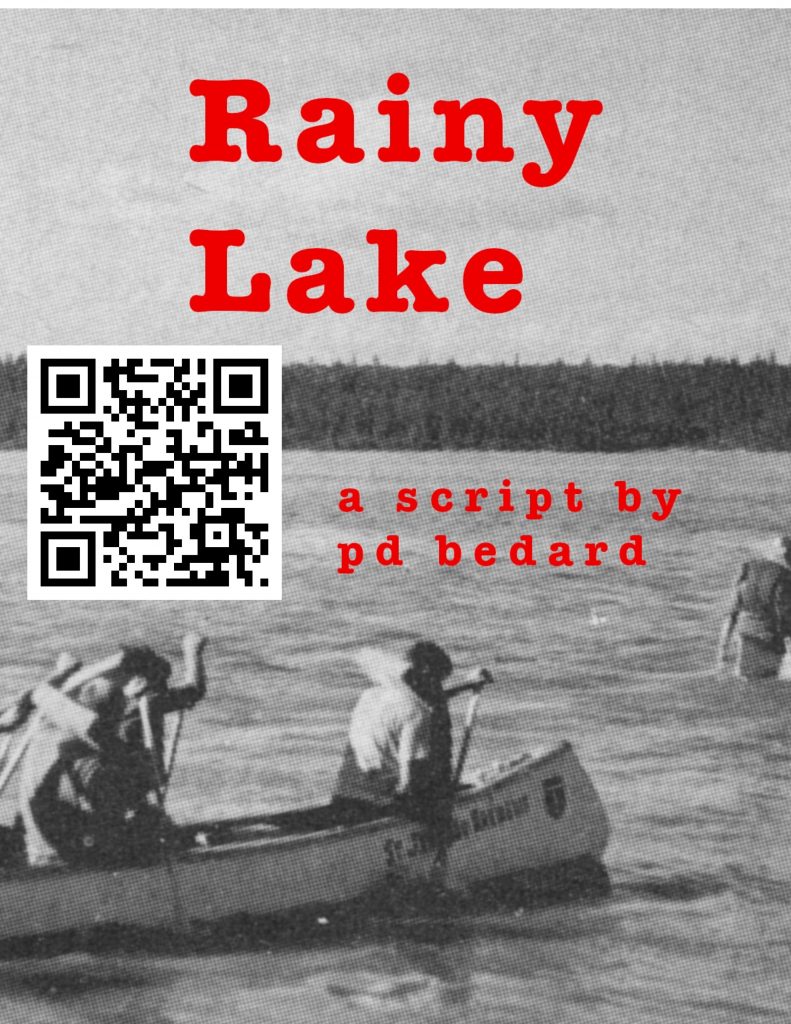by John Bedard
- Canadian Immigration Inspection Station, Cantic, PQ
- 25 December 1953
- 0330h

Editor's note: A Cantic Christmas first showed up in Kindle format back on December 26, 2013. I've edited it and put it up on bedard.com to breathe. Check out my comments about this story and two other stories about the border written by John.
The border where Québec meets New York, just north of Rouses Point and south of Lacolle, was a popular place for southbound traffic during Prohibition, from 1919 through 1933, as alcohol flowed south to a dry United States. By 1953, the border was more lonely than traveled, but just as cold and always wet, especially when snowing.
It wasn’t snowing that day, and you could taste the frozen as an eighth-inch crust sealed all the snow to the ground. The whole scene was Grant Wood, staged in an upstate New York way.
People wandered across this one entry all the time, sometimes challenged about their business and citizenship status, sometimes not. It’s my entry now. I’m the one in charge. I’m the one who susses dark secrets with a few questions (where ya goin’, where ya been? questions).
I was working the 12 to 8 shift with my good friend Jules, both of us fairly fresh members of the enforcement division of the Royal Canadian Department of Citizenship and Immigration. In the Service, you find friends where you can.
Our jobs and lives are metered in 8-hour shifts of 8 to 4, 4 to 12, and 12 to 8, but mostly 12 to 8, because of our junior status. It’s a seniority issue. Jules and I have none.
We work the shifts assigned and are in the middle of our third 12 to 8 rotation in a row. Just as well, it’s Christmas morning. No one sane is coming through at 3 am.
The Cantic Canadian border station is two miles due north of the U.S. Customs House, our opposite New York State inspection point at Rouses Point, manned by our good friends from the United States Customs Service.
Jules and I have slowly ratcheted our way up society’s scale. Neither of us went past our 9th grade. We were educated on the Grand Trunk Railroad, the merchant marines, and then Korea. We’ve gone wherever we seem to be needed or wanted.
Jules and I see value in being warm, well-fed, and relatively safe. We take the shifts as they come. We gladly take any shift assigned, especially if we can stay warm, well-fed, and relatively safe.
The wind tonight either blew up Lake Champlain or was sucked down the Richelieu River, depending on your perspective. Either way, making my way down from the village to the station for my shift tonight was no trivial exercise. It is winter and winter reigns in upstate New York / down province Québec.
Getting to the station so I can get on station is the first step. Many nights it’s the only step – getting here takes more effort than what my partner Jules and I will put in during our shift.
I want to make it clear to the reader that nobody has slept, sleeps, or will sleep while we are on station in Cantic. We work by the book, and the book says, “no sleep.” We live by the book in this station, depending, of course, on the book we are reading at the time.
If, at some time during our shift, as we sit in the lunchroom with our lunch buckets open in front of us, in front of our little stove radiating so much heat that you think your toes are burning in your steel-toed boots, and our heads slip down into our crotons sandwiches, we might “rest our eyes” for a few seconds, maybe even a minute or two, but hardly ever more than fifteen minutes, ever, that I can recall.
With regulations in mind, we always take turns “eating” to ensure that neither of us sleeps on station. Never, ever. Because sleep is bad.
No matter how you describe it, the graveyard shift is the graveyard shift. Tonight, I stand watch at the station desk while Jules “eats” with his eyes closed in the back room.
The windowless back room serves as the infirmary, our indoor secondary inspection for pat-downs and strip-downs, and of course, the lunchroom. There’s next to no draft unless the door is open, which cools things off in the summer and keeps it toasty in the winter. Of course, in the summer, you can theoretically jump in Lake Champlain to cool off. In the winter, at best, you can do the Robert Service thing and jump into a bonfire. The thought has kept me warm through many winters. Jumping in and getting warm.
And then I go think of something else, sex or food or whatever.
If by chance, our supervisor decides to brave the weather and icy roads to show up in Cantic, or if either of us thinks we need help with a potentially difficult or dangerous inspection, we have a mayday signal. The heavy glass Labatt’s 50 ashtray, usually full of smoldering rolled Player’s and Export A’s, thrown fast against an office wall is the signal.
The ashtray usually wakes Jules up. It only took three months and an AWOL US Marine who was out of his mind to establish our ‘ashtray into wall’ signal. Nothing says ‘I need you’ like the loud thud of a full ashtray bouncing off the thin faux wall separating the lunchroom from reception.
Nobody gets curbside service tonight – it’s just too damn cold, -20 °F topped with a little wind. Any of our potential clientele making their way to Canada will have to come inside for a talk, unless Jules agrees to go out there. After a careful interrogation, we will likely determine, quickly and efficiently, that a secondary inspection, especially if it must be performed outside, is not necessary. Again, it’s just too damn cold.
While Jules sits in the lunchroom on the first of his graveyard shift lunches, my feet sit propped up on the desk and I look south towards the Etats Unis, while reading a forgettable dime novel sporting a cover much racier than its writing.
It’s a spy novel about a guy who spends his days having sex and killing people. Very realistic. Written by an Anglo who now lives in Jamaica. I could use a personal introduction to the blonde in the black dress on the cover, but Cantic is a long way from Monaco and its casinos.
The writing is alliteratively sluggish tonight, much like the visibility outside. You can hear the snow gusting against the siding of the station. I have to stand up and take a walk around the office every fifteen minutes to keep from falling asleep. I jump up and down; roll three cigarettes and smoke two, one after the other. Anything to stay awake.
Suddenly, our first customer makes his way to our shack. A shadow stumbling in from the American side. Hard to say from here, but it looks like a pedestrian carrying a duffel on his back. He’s bouncing up and down. Boots, a light-colored greatcoat… maybe a toque on his head. We will see, we will see.
Poor bastard. What a night to be on foot. Probably a local farm worker coming home for Christmas Day dinner. The contrail of his frozen breath makes him seem six inches taller.
I decide to go into the lunchroom to get him a cup of coffee as he stumbles up. He deserves it just for being out there this morning.
Poor bastard.
“Got one coming in, Jules,” I said headed into the back to grab a refill for me and a tin cup for my soon-to-be-newfound friend.
No response from Jules, he may be eating another fifteen-minute meal with his eyes again.
Coming back up front into reception, I look out the window but can’t see anyone coming. I’ve lost him! Where could he have gone? He may be walking through, but the man just ran my border. I grab my coat and rush out the door.
My heart rate crests as I catch up to him thirty yards down the road, footing it north at a good clip. He’s got a huge gut and his greatcoat is a dull red, with a white lining. I stop to catch my breath.
“Hey! You! Where are you going?”
I pause for effect as we stare at each other. His breath is wet and strong, but he’s not winded.
“Where do you think you are going? You are now entering Canada, sir. You need to stop. Can’t you read the sign?”
“What do you mean read the sign? I wasn’t speeding, I swear! Besides, all I wanted was not to bother you. It’s too cold out here.”
“It is damn cold. Get in here.”
I motion to the door. “I got coffee for you.”
The two of us ambled into reception, taking care to step hard on the doorjamb to rid ourselves of the sticky snow on our boots. I grab a notched oak office chair that might have been part of the room since the last station remodel at the end of Prohibition in 1933, and direct our new guest into it.
“Have a seat, please.”
He sits.
“Now tell me all about it. Let’s start at the top. What’s your name, sir?”
“Nicolas, you don’t pronounce the ’s,’ Nicolas Leblanc, sir.”
“Great. How about I call you Nic?”
Leblance nodded assent.
“So, Nick.Citizenship? Place of birth?”
“What do you mean, seasonship?”
“Where were you born?”
“Oh, that? In Stratton, I think. Not sure, though. Might have been Lac Megantic.”
“Well, let’s say it’s Stratton. Which one is it?”
“What do you mean, which one? The one closest I guess?”
“What is this ‘you think’ business? Stratton is in Maine, isn’t it? Or Vermont? Don’t think they moved it, did they? Try again. Born in Vermont or Maine; neither makes you Canadian, Monsieur Leblanc.”
“Beg your pardon, Officer. No disrespect. Not sure. I just think I was born in Stratton. I was born real young, so I don’t remember it much.”
“Let’s assume you were born in Vermont, over there cross that border there. Then what? Do you have any paper telling me who you are?”
“Then what what? I got no paper on me but rolling papers. Let’s say, lately I worked for Old Man Barnes down the road here. Until Bessie, his common law I think, went to Albany to see her sister and never come back.
“Barnes started drinking more cidre after that. Not that I blame Bessie for not coming back, because living with Old Man Barnes is not always easy for Bessie, ‘specially when Old Man Barnes decides to drink le cidre.
“I’m not sure things are any better for Barnes either, when Bessie gets going. She listens to the Texas radio preachers, tub-thumpers raising all kinds of hell, at all hours, about damnation and bad spirits. She also likes to order the pills, by the bushel, that the ministers on the radio pitch, for diseases she does not have or knows nothing about.
“‘Just in case’ pills she calls them. As you can imagine this ‘just in case’ business gets Barnes pissed off, and I am not even going to try to tell you what it does for his blood pressure.”
I let Nicolas continue. No need to stop him now.
“Once Bessie gets busy doing these things, her cooking goes all to hell. No salt in the soup, no salt in the stew, hell, no salt shaker in the house. The more trips Barnes makes to the village to buy salt, the more salt Bessie throws out the door behind his back. Things got so bad, I have to go to a neighbor’s barn and hammer me a piece from the cow’s salt lick.
“Not that bad that salt, by the way. Carry some with me all the time. Probably the way they get it from the mine. Care to sample?”
Nicolas reached into his pocket and took out a small muslin satchel I assumed had some of the salt lick salt. I waved my hand at him and shook my head – I didn’t want to see. Not tonight. It was Christmas morning.
“I was saying,” he began.
“As you were telling me.” I interrupted.
“That’s right, and as Bessie, the wife, got more and more religion, she had less and less time for the cooking and the washing. The old man got fed up with having to buy salt twice a week. We weren’t to figure out what was going on until last month.
“At three in the morning, hearing some weird noises and strange singing outdoors, I came downstairs, and looking out the window, spotted Bessie throwing something around the sides of the house. Later that day, once I had told the old man about it, he faced her with the facts. She told him the bad spirits had taken over the house and that she was trying to chase them away. With blessed salts.
“‘What blessed salts?’ the old man asks her.
“‘The blessed salts that I got the priest to bless,’ she says.
“‘Bull,’ he says, ‘damn priest Murphy would never do it.’
“‘Oh yes he did!’ says Bessie. ‘When I get him to bless a medal, I hold the medal in one hand, and a bag of salt in the other.’
“Barnes got angry. He told Bessie it was too late, she was infested with bad spirits already, and salt, blessed or not, was not going to help anybody. He had her moving out in the best interest of all concerned.
“So, she moved out.”
“Enough about Bessie and the old man. Your parents, what can you tell me about your mum and dad?”
“My mother – French. My father? No idea, not sure – they just told me he was lost in the first war. I am sure of that because on every 11th of November at 11 am, rain or shine, some years it is mostly snow or shine, we stop whatever we are doing, take off our coverings, and bow our heads for a minute.”
“You wear a poppy?”
“Yes, sir. Every year when I can.”
The conversation stopped. He started looking into the wood floor, vacantly.
“Did I tell you about Old Man Barnes being mean when he took to le cidre? I did. Good.
“Now I want you to know that I am the type of person who can overlook getting my thirty bucks a month late or even not getting it at all, when things get tight on the farm, but I want my share of the juice when there is some to be had. On that, I have to insist. We ran out of cidre and the old man can’t cook. Gotta move on. Here I am. No pay, no cidre, no decent food. I leave.”
Blowing snow announced itself against the windows in reception. I was enjoying the heat and having someone or something to get me through my shift awake, no matter how inane the story or misadventures.
“Now, Monsieur Leblanc, what can you tell me about your citizenship status?”
“Seasonship? Citizenship? Oh, yes. Well, I had a long talk on that with an officer in Rouses Point last year. I explained everything to him, and he let me through, and he promised me, better . . . he swore he would have an answer for me in his hands the next time I went by his place. I just want to be like everyone else, who cross every day.
“I want to be able to answer the next time someone says: ‘What is your seasonship?’ I want to say, ‘Yes sir; I am one of them, I am.’
“I want it to be like it was in the army. I want to snap to it and salute when I hear that music. Can you help me, sir? Do you think you could fix me up?
“This citizenship business is screwed up. I got no paper. I got no memory but what’s here around the Lake Champlain.”
He said Champlain without pronouncing the “m” or the “n.”
“Let me refill your cup, and then we talk. Stay there, please.”
I excused myself and went into the bathroom and stared in the mirror for a sec before doing what I had to do. Took my time to wash hands. Slapped my face a couple of times to stay awake and walked back out to reception.
“Now back to that citizenship bit. Where were you born?”
“In or around Stratton, I think. I know for sure that the doctor came in from Sainte Anne and that I was baptized in Sainte Anne. Sainte Anne is in Québec, you know.”
“I know. What about school?”
“In Sainte Anne, too. That I know for certain. Actually, there was not much of that because it happened at the time my father was reported missing, and as we lived a long way from the village, I did not go for long. That I know.”
“Work, social security, unemployment benefits?”
“Away from home, since I was thirteen. Farm and bush work, here and there. Potatoes in Maine and lumber camps all over – Québec, Vermont, and New York upstate. I have a US Social Security Number somewhere and I collect unemployment money in Québec when I can.”
“What about the army? Did the draft get you? What about voting?”
“You bet they did. Shipped me to Alaska, too. Cold mother up there I tell you, but not as bad for me as for some of the others. We had this captain from Florida I believe, or was it Alabama? Anyway, he got up one morning …”
“Mr. Leblanc, stop, please. We want to be done here before the ice breakup on the Richelieu.”
“Right. Now what else do you want to know? You asked me about voting. Correct? Yes, I vote in Québec when I am there, but I vote over there, too.
“I remember one very well-organized election in Albany a few years back when, matter of fact, we voted a few times. But why all this now? Jimmy, the officer in Alburg, told me that he would send everything to Washington and let me know when the results came back. They should have decided by now.”
“We are not in Alburg and Jimmy works for my counterparts on the American side protecting his border, not the Canadian one.”
“You guys must talk! Check with him! Pick up the phone! Use the hotline!”
“No such thing as a hotline.”
“Sorry officer. Just trying to be helpful. Now, as I said before, if you check with Jimmy, I bet he will give you the results of his inquiries to Washington.”
“Monsieur Leblanc, but I cannot check with him because I work for the Canadian, not the US Government. Look, what are you planning to do in Canada?”
“Well, I was thinking about going to Monsieur Latour’s place, down the road here, for a while. Spring will be here shortly, and he will need help setting up his eel traps on the Richelieu. We get along good, and he has cidre.
“Officer, I am not lying and don’t know more than that. I know that I was born here, baptized there, went to school here, worked there, registered for the draft here but went into the army there.
“I don’t have the money to get papers and it is always trouble, trouble, and more trouble, every time I turn around trying to cross your line. What harm have I ever done to anyone? There I have been all those years, pulling my way, minding my own business, always trying to do my best.”
“I am with you, Nic. This is a mess and I would not want to be in your shoes.”
I’m as straight as they come and certainly as straight as we all need to be, but we all have our limits. For me, it might have been on a ship headed to Korea or in the North Atlantic headed for Liverpool. I’d been through too much in the last fifteen years.
It’s Christmas morning, very early Christmas morning, and I’m dealing with an undocumented transient named Nicolas, who is trying to come to Canada to access a steady source of work and cider.
“Here,” I told Nicolas as I handed him a comb out of the vending machine in the bathroom, “I think I have a deal for you. Take this, go into the bathroom, do your thing, comb your hair and I’ll get you on your way, but we have to do a ceremony.”
“Yes, sir! I mean, no sir! On my way, sir! Be right back. Right back.”
Nicolas Leblanc rushed into the bathroom with the expectancy of a new groom getting ready for the service, without quite knowing why he was getting ready. He came out his white hair combed. His greatcoat seemed a little redder in the light.
“Are you ready?” I asked.
“Yes, sir, I am.”
“You stand up now, raise your right hand, and repeat after me.”
Leblanc stood tensed and raised his right hand.
“I, Nicolas Leblanc.”
“I, Nicolas Leblanc.”
“Swear that I will be faithful and bear true allegiance to Her Majesty Queen Elizabeth the Second, the Queen of Canada.”
“She be the Queen of Québec, too?”
“Nicolas, come on.”
“I swear I will be faithful to her Majesty, Queen Elizabeth.”
“Queen of Canada.”
“Queen of Canada.”
“Her Heirs and Successors.”
“Heirs, successors.”
“And I will faithfully observe.”
“Faithful observe.”
“The laws of Canada and fulfill my duties as a Canadian citizen.”
“Laws of Canada and duties as Canada citizen.”
“Excellent! Now do the sign of the cross to seal the oath and allow me to shake your hand. Merry Christmas, Nicolas, you are the newest Canadian citizen in Cantic!”
“Thanks, Officer! Would you say that this calls for a drink, now?”
“I have a few more hours on shift so I will decline the offer of caribou.”
I decided to take a more serious tone with my newly minted Canadian.
“Listen, Nicolas, let me remind you of something. You must always keep secret the ceremony we had here this morning. Because if you don’t, the American authorities, hearing that you became a citizen of Canada, may get peeved at you and bar you from traveling and working in their country. You understand that?”
Nicolas bobbed his head.
“You can always mention my name, but it will be better if we keep what happened here strictly between ourselves. Let’s say it is just a dream, a beautiful dream. You got that straight? Godspeed and good luck. On your way, now.”
The newly-minted, or maybe just newly reaffirmed, if that’s possible in immigration law, Canadian or otherwise, Nicolas Leblanc opened the door into the night. The reflection of the moon on the snow lit up the sad border reception area.
As he crossed the threshold of the door his greatcoat turned as red as fresh felt. His beard seemed more fleshed out and authoritative. I remember hearing bells and snow blowing against the window.
And then, I remembered Isaiah. Almost as if the words were injected into my head.
“For unto us a child is born, to us a son is given, and the government shall be upon his shoulder.” Isaiah 9:6-7
I heard Nic’s voice: “It is a dream, John. You best keep my name to yourself. Now let me get back to the sleigh, the reindeer are getting restless. I don’t have all night.”
“Right.” I thought. “Enjoy Canada!”
I woke up on the floor of reception, in a cold sweat, but not uncomfortable. My cheek was half-stuck to the dusty floor with drool. My coffee sat on the table, lukewarm.
“What the hell, John! Get your ass up before someone sees you.”
It took a few seconds before the blue blob I knew to be Jules came into focus.
“John, you are scaring me. What’s going on with you?”
“It’s Nicolas Leblanc, Jules, he came through. Again.”
“Sure, John. Joyeux Noël.”
“Joyeux Noël, Jules.”
It was my last Christmas in Cantic.





